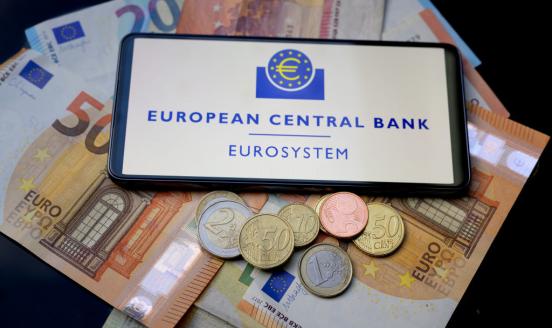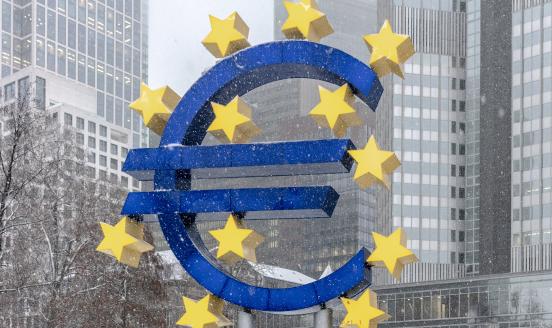Europeans take the Euro for granted
We compared an analysis of the media with the preliminary findings of a qualitative research project. The results confirm national differences, but hi

How can we understand citizens’ attitudes towards the euro and its politics?
A previous research project studied narratives of the euro crisis and explored the blame game that marked these years. The study found part of the answer to why it has been so hard to come up with a common policy agenda, Europeans do not share common political narratives.
This analysis used algorithm-based research from 50,000 newspapers articles from four major outlets in Germany, France, Italy and Spain. The approach provided insight in how societal discussions framed the euro crisis. However, the study mostly looked at the elite level, leaving behind whether citizens produced or reproduced similar discourses. For this reason, a qualitative and granular analysis could confirm the findings and further investigate some of the questions opened up back then.
An ongoing research project is using the method of focus groups to look into citizen’s perceptions of the euro. While the results of such groups are not generalisable to the whole population due to their small sample size, they do offer a ‘microscope’ studying how people produce discourse on the ground. While surveys like Eurobarometer tell us about the general support for the euro, they tell us little about what considerations opinions are based on, or whether citizens hold strong opinions in the first place. Focus groups put participants’ own reasoning at the centre, and can, therefore, show how people actually understand the euro and its politics in their own words.
What do hairdressers, bankers and unemployed people think about the Euro?
Between May and October last year, nine focus groups gathered in the capitals of Italy, France and the Netherlands, composed of financial professionals, hairdressers, and structurally unemployed. The recruitment aimed at maximizing diversity in demographics and political preferences.
Each group discussed the same questions, revealing the general perceptions of the euro (e.g. who do you think has benefitted from the euro, and who has not?), and evaluating particular normative questions (e.g. how do you think about this statement: being in a currency union together means that euro countries should have solidarity with each other).
The experiments produced a wealth of data, in which several trends stand out. While the analysis is still ongoing, a preliminary reading gives a good sense of what is at stake.
The blame game: North vs. South?
The earlier study showed how narratives of the euro crisis differed between countries. The focus groups confirm the importance of national perspectives: in all focus groups, we mostly refer to one’s own country, and they are foreign citizens and governments.
Within the groups in Amsterdam, the dominant perception emerges that Southern countries are to blame for the euro crisis. Having been responsible for their own economic problems, they forced Northern countries to unwanted redistribution. This also leads to a perception of the euro benefiting Southern debtor member states at the expense of Northern ones. Sharing a currency comes at the cost of transfers to the South.
In Rome, perceptions points in the opposite direction: to a euro that has worked better for Northern countries, for example, because Italy has lost its ability to devalue. However, this does not often lead to criticism of the euro itself. Since for most participants, blame for economic problems is in the first place attributed to their national government. As a consequence of their low trust in their national government, most participants are surprisingly positive about a European framework forcing the government to act responsibly.
In Paris, perceptions also follow ‘Southern’ lines of reasoning. Northern countries are generally seen as benefitting, and Southern ones as disadvantaged. However, this is seen more as a reason to reform the Eurozone than to reject it. While the French groups were more likely to bring up the idea that France loses too much autonomy, most hold that it is not the euro that is particularly problematic in this regard. Rather, they tended to discuss the general state of France – usually perceived as not too rosy.
Citizens tend to think about European politics and the direction in which society is heading, rather than on the euro as a specific item
To a large extent, these differences fit with the earlier findings on national narratives. Just like Süddeutsche Zeitung often blamed Greece during the euro crisis, so do Dutch participants blame Southern Europe. A difference is that the ECB, featuring prominently in Germany, is hardly present in the Dutch discussions. Likewise, the finding that Italians blame their own government is consistent with findings for La Stampa. For France, Le Monde’s reporting on the euro crisis goes together with a general sense of French déclinisme, rather than leading to criticism of European institutions.
Beyond national narratives
The focus groups, however, showed more than only national differences. They also showed significant variations and similarities between social groups in how people make sense of the euro – especially between the financial professional groups and the other unemployed and hairdressers.
For example, the group composed by Dutch bankers introduced Italian and Swiss colleagues as ‘people like us’, and who therefore deserved help in shared issues. The unemployed and hairdresser groups expressed polarisation between “normal” citizens and political and business elites. The Dutch unemployed group, for instance, sympathised and identified with “Greek common men” as victims of the political elites and the economic system at large.
Such correlations among social groups beyond the national segmentation also showed in the language used. While the financial professionals discussed the euro more at an abstract level, the groups of unemployed and hairdressers perceive the euro more through the lens of their daily lives (‘the euro made things more expensive’, ‘I remember going to the bakery after the euro’s introduction and paying with different coins’).
And while a more abstract definition of the currency might still seem as a trivial difference in the sophistication of vocabularies used, it is indicative of a pattern in how people make sense of the politics of the euro. When asked to discuss the consequences of the euro for example, financial professionals found it self-evident to discuss how the euro impacted countries differently. The other social groups, however, described the effects of the euro much more in terms of societal conflict. Rather than member states, it is multinationals and governments who have benefitted from the euro, while ‘the common man’ is left behind.
This relates to a second important point. Perceptions of the euro are embedded in political orientations and general societal questions. For most participants, the euro is just one small element in a much larger, more blurry political system. They find it difficult to see how the euro itself brings up political questions like solidarity or national autonomy. While the euro crisis is a familiar theme, many participants have difficulties linking it to the currency in their pockets.
Therefore, people are not likely to base their opinion on the euro on how it is connected to particular questions of monetary policymaking, national autonomy or solidarity. Instead, they would rather evaluate it as an object in their daily lives, something that made travelling easier, or something they feel led to inflation in the years after its introduction. Or, they will base their opinion on their stance towards European integration, or even politics in general. For example, those who oppose it might do so because they see it as part of an elite project that they distrust. Not because they dislike the ECB's power or the Stability and Growth Pact rules.
Citizens tend to think about European politics and the direction in which society is heading, rather than on the euro as a specific item. They might have an opinion on the politics of the eurozone, such as the need for solidarity between countries. For most participants, however, the euro is just a practical artefact that is taken for granted.
Europeans want to remain in a reformed Eurozone
These preliminary results hint at correlations between the media narratives shaped during the euro crisis and the perceptions of the currency among specific groups of citizens. While it should be noted that the results are partial, it shows the persistent effect of national framing deployed by the media, even years after the crisis.
At the same time, they show that citizens’ opinions on the euro are not a simple replication of media narratives. Instead, such narratives are reproduced differently in different social groups. It is people’s preexisting perception of politics and society that structure the reception of such narratives.
As a consequence, citizens are not likely to question the euro itself, as they perceive it as a practical rather than a political object. If they evaluate it at all, they're likely to do so on the basis of its practical consequences. When citizens do perceive the euro in a more political way, this perception is usually embedded in as part of a broader stance towards European politics. However, it does not mean that the euro is safe from public contestation. If citizens will question something, it is more likely to be side effects of the euro, such as a need for solidarity.
In case of a future crisis, political entrepreneurs might then use such political disagreements to try and mobilize citizens against the euro, hoping that citizens’ indifference towards the euro and the accompanying lack of a ‘reservoir’ of support is in their favour. However, given the difficulty people seems to have in linking the consequences of the euro with the currency itself, they would have a hard time selling their message. Even the euro crisis seemed not enough to bring this message across to the general public.
Does it mean that it is more difficult than it may seem to mobilize citizens against the euro as a project? We cannot say that for sure. But the results hint for a potential shift towards a debate that questions political choices, rather than folded around the legitimacy of the euro or of the institutions underpinning it.
Recommended citation
Melman, J and Porcaro, G . (2020), ‘Europeans take the Euro for granted’, Bruegel Blog, 03 March. https://bruegel.org/2020/03/europeans-take-the-euro-for-granted/



